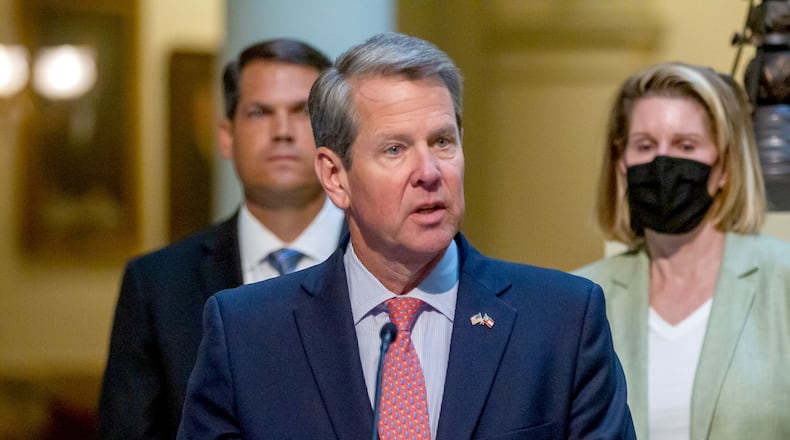Gov. Brian Kemp on Thursday joined the growing chorus of Republicans bashing “critical race theory,” the educational concept that seeks to highlight how historical inequities and racism still shape public policy and cultural conditions.
The Republican, who is aiming to build conservative support ahead of a tough reelection fight next year, urged the state Board of Education to take “immediate steps to ensure that Critical Race Theory and its dangerous ideology do not take root in our state standards and curriculum.”
“We must instead focus on our goal of providing the highest quality education to every child in Georgia, without partisan bias or political influence,” he wrote, adding that taxpayer funds should not be used to promote a “blatantly partisan agenda.”
Pressed for its definition of the concept, Kemp’s aides referred to an Encyclopedia Britannica entry that calls the theory a loosely organized framework based on the premise that U.S. legal institutions “are inherently racist insofar as they function to create and maintain social, economic and political inequalities between whites and nonwhites.”
Kemp’s office didn’t provide examples of whether it was being taught in any of Georgia’s 181 public school districts, though his aides said a new education policy would preempt that possibility.
Critics accused Kemp of trying to score points with conservatives who are wary of his falling out with former President Donald Trump by seizing on a GOP talking point.
”Acknowledging racism and its impact on our country shouldn’t be political,” said Jason Esteves, who chairs the Atlanta Public Schools board. “But when you need to please Trump, nothing is off limits — even if it means interfering with local control and banning a class that isn’t even taught in any of the 181 school districts in Georgia.“
Esteves, a senior officer of the Democratic Party of Georgia, added: “We need a governor that will tackle issues that actually impact Georgians, not one offering solutions in search of problems.”
The Georgia Department of Education does not mandate the teaching of any particular curriculum. Rather, the agency adopts standards about things students are expected to know and be able to do by certain grades, whether it’s addition in math or the history of the United States in social studies.
For instance, fourth grade social studies students are expected to be able to explain the causes, major events and consequences of the Civil War. Some school districts adopt curriculum. Others leave it to teachers to write their own. In some, it’s a mixture of both.
Kemp’s position contrasts with an academic movement that encourages teaching about systemic discrimination that left a legacy of racial inequality that persists today.
The conservative backlash has grown in recent weeks, and at least one GOP district last weekend adopted a resolution condemning the concept. Lawmakers in other states have gone a step further, seeking to restrict how race and racism are taught in k-12 curriculum.
In Georgia, Attorney General Chris Carr earlier this week joined 19 other state legal officials to oppose new federal rules regarding the teaching of the theory, along with the Pulitzer-Prize winning “1619 Project” by The New York Times that examines the legacy of slavery and racism in U.S. history.
The letter to the U.S. Department of Education specifically opposes a proposed rule that would prioritize grants for certain schools teaching critical race theory and the “1619 Project.”
Carr, who also faces a heated re-election battle, said the rule would “impose the flawed, radical teachings of critical race theory in Georgia’s schools” and that it must be rejected.
- Staff Writer Ty Tagami contributed to this report.
About the Author
The Latest
Featured




